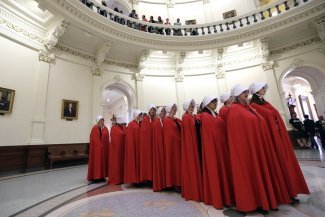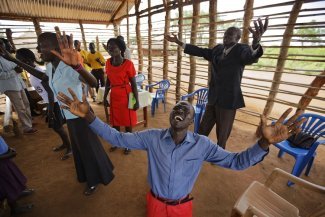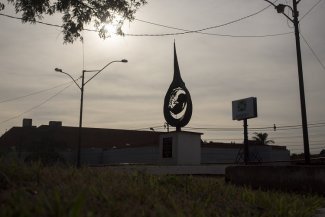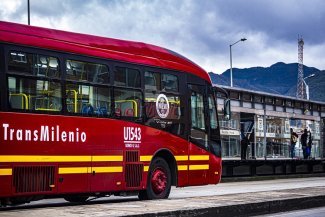
Why are evangelical churches in Latin America increasingly influencing the region’s political, social and economic agenda? Argentine sociologist Ariel Goldstein provides some insight into the phenomenon.
Evangelical churches have burst onto the political, social and economic scene in Latin America in recent decades. By permeating the boundaries separating church and state, they are managing to push agendas that part of the public do not support, particularly when it comes to issues related to the family, gender or sexuality. While, in the past, the influence of these churches was largely limited to their congregations, today, their growing presence in the political sphere, be it through political party or electoral representation, has triggered alarm bells about a possible evangelisation of politics and the potential threat this poses to democracy and certain established rights.
In Latin America, according to the Chilean pollster Latinobarómetro, almost 22 per cent of the population identifies as evangelical, which is very high for a region that has long considered itself to be Catholic. And although the majority remains Catholic – 56 per cent – identification with this religion is decreasing as the numbers turning to evangelical churches increases.
Equal Times spoke with Argentine sociologist Ariel Goldstein, PhD in Social Sciences and author of Poder Evangélico. Cómo los grupos religiosos están copando la política en América (Evangelical Power. How religious groups are taking over politics in the Americas), to gain some insight into why these churches, despite being in a minority, are becoming increasingly influential in the region.
Who are the evangelicals, what do they believe in and what values do they stand for?
They are groups with different internal ramifications and it seems to me that the ones that have grown the most in recent years, especially in terms of political action, are the Pentecostals and the Neo-Pentecostals. These groups are characterised by bringing the theme of miracles into their faith, the belief in demons and the idea of a struggle between good and evil.
There is also the matter of prosperity theology, which implies the establishment of a covenant with God for economic prosperity. The extent to which the faithful donate to the church is thought to have an impact on their lives. And this is connected with the issue of entrepreneurship in Latin America, which is an important force in the economy, and people who are perceived as entrepreneurs, especially in the lower middle-class and low-income groups.
How do you explain their growing prominence in the region, and what are they doing to ensure that their churches are gaining ever more followers?
What stands out in the Pentecostalism phenomenon is the plasticity with which these churches adapt to local customs and forms of worship; their church services and gatherings are held using language that people can identify with. The pastors usually live in the communities where they preach and are part of the community. They are also able to marry, unlike the [Catholic] priests, which is also why they are perceived as being closer to the people. And they make very extensive use of social media, something the Catholic Church does not seem to have developed as much. In the case of evangelical pastors, many of them are influencers, especially in Brazil, where this phenomenon is huge, but in other countries too.
[Added to this is] their plasticity when it comes to recognising sources of innovation within society and incorporating them in their worship: evangelical rock bands are an example; the concerts, the music element, give these religions a very strong emotive and rallying force.
These churches often operate like businesses, competing for followers, and alongside their churches they also have amenities such as food courts, sports grounds or child care facilities. These recreational and care facilities are also places where families receive religious indoctrination. It is how these churches build community.
In the political sphere, what impact has the expansion of these groups had in Latin America?
These churches are generally linked to authoritarian political leaders, [Jair] Bolsonaro [in Brazil], [Donald] Trump [in the United States]; there has also been talk of Daniel Ortega in Nicaragua and his alliance with the churches; [Alberto] Fujimori [in Peru], back in the day; Rafael López Aliaga [mayor of Lima]. They are leaders with authoritarian tendencies and a generally more conservative agenda in terms of gender, sexual or reproductive issues.
The Pentecostal evangelicals stand out for their political involvement and their presence in terms of pushing an agenda in defence of the family, etc., because the issue of family is central, not only outwardly, in the defence of a moral agenda, but also inwardly, as the pastors’ families are seen as role models, and so they become opinion leaders of sorts for the churches’ followers, an example of the perfect family, a model to emulate.
Are these links exclusively with right-wing forces?
There can be tactical alliances, as seen in the past with Lula da Silva and Dilma [Rousseff, both on the left of the political spectrum] in Brazil.
But when they join with right-wing governments, a different kind of alliance is forged, with more of a shared worldview. There is an economic exchange, for example: their churches benefited economically from Bolsonaro’s rule. And not only economically, but also with concrete policies that led the state towards a conservative moral agenda. Another example is Rafael López Aliaga, the mayor of Lima, who founded the Renovación Popular party, a kind of Peruvian Bolsonaroism: this is an alliance between the military, the conservative Catholics of the Opus Dei and the [evangelical] pastors.
Political alliances also sometimes emerge between conservative Catholics and evangelicals, to fight against abortion, as seen in Argentina, in Buenos Aires, with the mobilisations of 2018, for example. Conservative Catholics and evangelicals are in competition with each other but there are also times when they cooperate with each other and work in unison.
What is at play in this web of alliances and powers?
The issue of values and ideology plays a role in these alliances, which is why I say that there is a shared worldview when this alliance is with right-wing governments. Another important issue is the relationship with the state, as the closer the groups are to the state, the more they are able to acquire resources and to influence public policies, which is why they develop a very pragmatic relationship. Following Lula’s victory, for example, [evangelical leader] Edir Macedo said: “Well, we are already praying for the good of Lula, he is God’s chosen one”, because they have the plasticity to constantly readapt to the government of the day.
For me, Brazil is the clearest example of how all this works. For instance, what most interests the evangelical bench in the Brazilian Congress is access to the Science and Technology Commission. Why? Because it is the one that grants broadcasting licences. They want to develop their own media [...], but relations with the state are key to accessing the media. These churches start out collecting the tithe, then they grow and their next step is to purchase space in a media outlet or, as seen in Brazil, to purchase a media outlet of their own, as Edir Macedo [founder of the Universal Church of the Kingdom of God] did with TV Record.
Is it possible to govern in Latin America without the backing of evangelical churches?
It depends on the country. In Uruguay it might be possible, in Argentina it might still be possible, in Brazil it might not. In Mexico, I doubt it is possible. An important factor is how religious the society is, regardless of whether they are evangelicals or not, on how many Catholics and evangelicals there are in society. Mexico, for example, has legislation that is quite defensive of the secularity of the state, but with 95 per cent of the population being religious, be it evangelical or Catholic, there is a high level of permeability, a strong presence of religious groups in the structures of the state, which explains the alliance between AMLO [President Andrés Manuel López Obrador] and the evangelical churches.
Are these groups a danger to the region? That is to say, to what extent can they be considered a ‘threat’ to certain rights?
To say that they are a threat is somewhat stigmatising. I would say, rather, that they are groups that build community, that do valuable social work, but when they act in politics, maybe they act in questionable ways because they are not very tolerant of other people’s beliefs and, sometimes, as we have just seen in Brazil, they tend to demonise the other. The agenda of the Bolsonaro government was very much driven by this type of vision, which does not accept pluralism but wants to impose a religious agenda on groups that do not think the same way, and this can undermine the foundations of democracy.
What can be done to tackle the rise of this evangelical power?
I think it is important to defend the secular state. Also, the growth of these churches is bolstered by a lack of state presence or the presence of corrupt authorities in poor neighbourhoods, which is a major problem in Latin America. The state is going to have to take more coordinated action with NGOs, for example, with civil society groups and political groups that defend a secular state but act socially within neighbourhoods, that build community, not religious community but a community of intermediate associations within society that provide people with support, to help them get out of drug trafficking rings, because in Brazil, but also in other countries, the churches and drug trafficking are what’s most present in the favelas and poor neighbourhoods. This issue is fundamental because the growth of the churches and their political activity is the result of the state’s lack of effectiveness in resolving the major problems people face.












